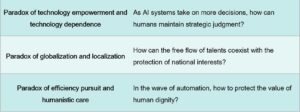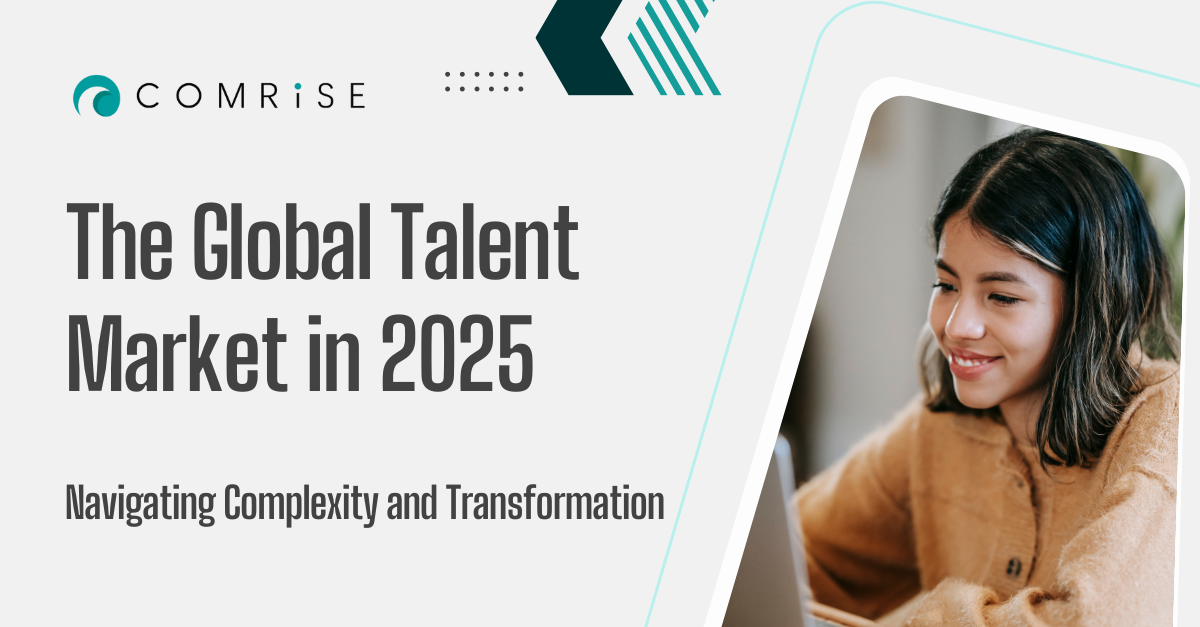The global talent market in 2025 stands at an unprecedented historical juncture. Exponential advancements in artificial intelligence, dramatic shifts in geopolitical landscapes, generational changes in population structures, and the pressing demands of sustainable development goals have collectively created a complex and tension-filled ecosystem. In this era where technology and humanism intertwine, the rules of the talent market are being rewritten. This article delves into the key trends shaping the global talent market over the next two years, examining technological integration, talent structure transformation, educational system reforms, corporate strategy adjustments, and policy responses.
Technological Revolution: From Tool Dependency to Human-Machine Symbiosis
By 2025, AI technology has moved beyond its initial “assistive tool” phase into a deep collaborative era as a “decision-making partner.” The World Economic Forum’s 2023 Future of Jobs Report predicts that 97 million new roles will emerge globally by 2025, with over 65% related to deep human-machine interaction, such as AI trainers, data ethics consultants, and human-machine collaboration coordinators. This shift is reshaping talent value assessment systems:
Quantum Skill Stacking
Traditional linear skill requirements are being disrupted. For instance, manufacturing engineers now need expertise in digital twin modeling, carbon footprint calculation, and cross-cultural team management. Similarly, clinicians in healthcare must combine genomic data analysis with patient emotional intelligence. LinkedIn data shows that 87% of high-demand roles in 2025 will require cross-disciplinary skills from at least three fields.
Building Trust in Human-Machine Collaboration
As AI decision-making systems gain influence in hiring and promotions, establishing transparent and trustworthy frameworks is crucial. The EU’s proposed “Algorithmic Accountability Act” mandates that companies disclose AI decision logic and incorporate human veto rights. This has spurred roles like “AI compliance officers,” requiring expertise in law, ethics, and technology.
The Double-Edged Sword of Technological Democratization
Cloud-based development platforms and low-code tools have theoretically lowered technical barriers. GitHub’s 2024 report reveals a 210% increase in code contributions from developers in developing countries. However, the digital divide persists, shifting to deeper issues like access to computing power and data quality control. UNESCO warns that 3.2 billion people still lack basic digital literacy training.

Talent Structure: From Pyramids to Dynamic Ecological Networks
The Rise of Hybrid Employment Models
Full-time employment will drop from 68% in 2020 to 52%, with project-based work, gig economy roles, and AI-managed teams taking up the other half. This shift is driving innovations in social security systems, such as Singapore’s “Career Savings Account,” which allows freelancers to allocate income from various projects into pension and healthcare accounts.
A Paradigm Shift in Talent Valuation
ING Bank’s “Skill Blockchain” pilot project offers insights: employees use distributed ledgers to record fragmented learning outcomes, enabling employers to match “skill hashes” with project needs in real time. This dynamic assessment system has reduced the weight of traditional degrees, while the market value of micro-credentials has surged by 270%.
Accelerated Global Talent Circulation
Remote work advancements have expanded the “digital nomad” population to 120 million. Countries like Portugal and the UAE attract high-skilled migrants through “golden visa” policies, while emerging economies like India and Nigeria see “reverse brain drain” as Silicon Valley engineers return home to launch AI startups, leveraging local cost advantages and global networks.

Corporate Strategy: From Talent Competition to Ecosystem Co-Creation
Facing an increasingly complex talent landscape, leading companies are redefining strategies across three dimensions:
Building Resilient Talent Supply Chains
Tesla’s “vertical talent pool” strategy is noteworthy: investing in vocational training centers near lithium mines to cultivate a workforce skilled in everything from mining robotics to battery recycling. This deep integration has reduced recruitment cycles for critical roles by 60%.
Quantum-State Organizational Culture Management
Microsoft’s “3D Culture Coordinate” system innovates cultural fit assessment by analyzing employee behavior across flexibility, purpose, and growth. This dynamic approach has boosted talent retention by 40%.
Elevating Human-Centric Values
Unilever incorporates “employee well-being indices” into executive KPIs, using wearable devices to monitor stress levels and offer personalized health solutions. Viewing human capital as a strategic asset rather than a cost center has driven an 18% productivity increase during global health crises.
Conclusion
As we approach 2025, three paradoxes challenge all stakeholders:

The answers to these questions will determine whether the talent market fragments or achieves inclusive growth. What is certain is that nations, companies, and individuals who can transform technological dividends into human development opportunities and convert competitive pressures into innovation will lead the future talent revolution.
讯å‡
At Comrise, we offer tailored solutions for the full-time, part-time, direct-hire, contract, and permanent talent that your business needs. For 40 years, we have delighted our clients and candidates by focusing on customer satisfaction, innovation, and flexible workforce solutions!
If you’re looking for new job opportunities click here, or if you’re looking for a reliable partner to help you secure top-notch candidates for hard-to-fill roles, click here. For more information, feel free to contact us, click here.


